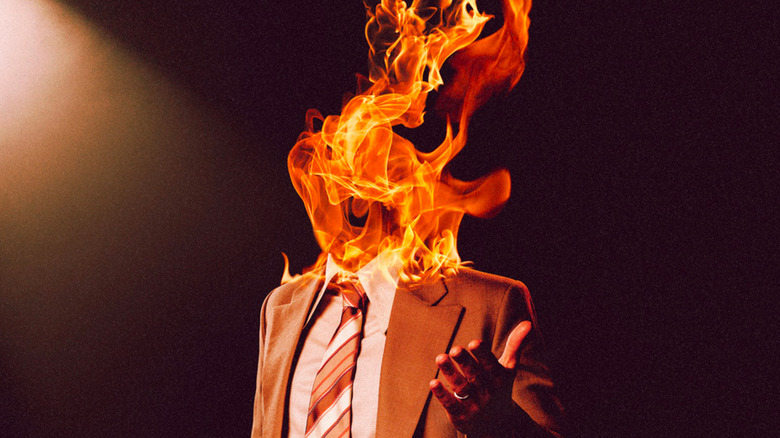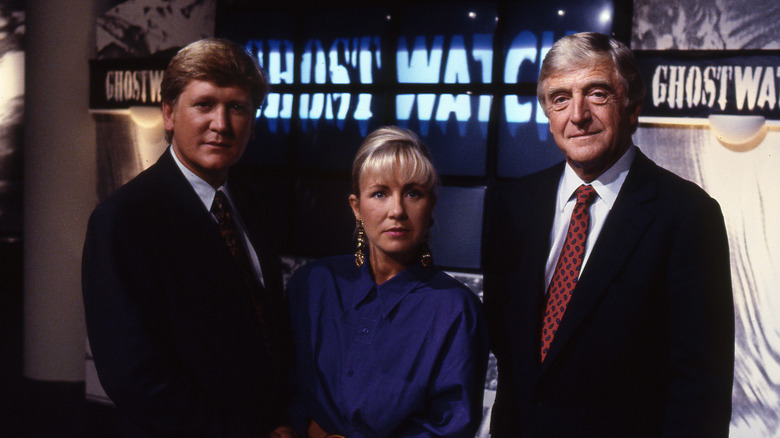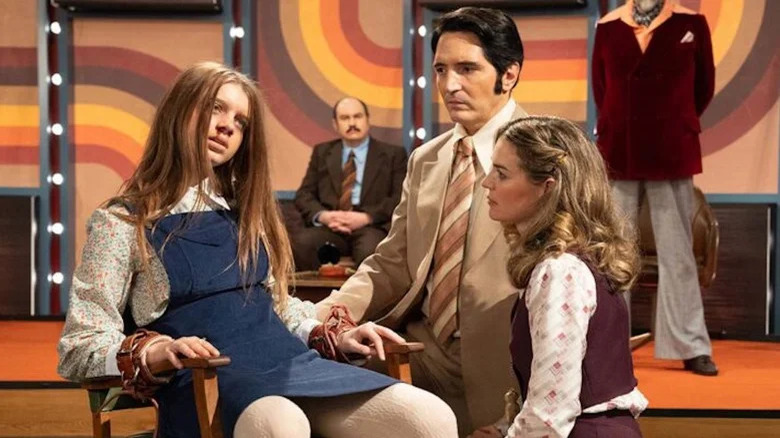Late Night With The Devil Is The Heir To A Classic Horror Mockumentary
"Late Night with the Devil" is one of the best horror movies you'll see this year — a clever, effective, and most of all scary mockumentary that recreates the era of '70s late-night talk shows with a nightmarish twist. What if a "Tonight Show" clone suddenly succumbed to demonic possession — live on the air? "Late Night with the Devil" has the answer, suggesting that a little hellfire can be good for ratings.
Written and directed by Colin Cairnes and Cameron Cairnes, "Late Night with the Devil" introduces us to Jack Delroy (played by a very committed David Dastmalchian), a wannabe Johnny Carson who hosts "Night Owls with Jack Delroy," a New York City-based late night variety and talk show struggling to stay afloat in the late-night ratings wars. It's Halloween night, and Jack has a special show planned, in which two of his guests are a parapsychologist (Laura Gordon) and her patient, a young girl named Lily (a scene-stealing Ingrid Torelli), the only survivor of a Satanic cult.
"Late Night with the Devil" unfolds with both footage of the live, Halloween-night broadcast of "Night Owls," coupled with behind-the-scenes footage that rolled when the show cut to commercial. It perfectly captures the vibe of a late-night show mixed with a slow-building sense of horror just waiting for the right moment to be fully unleashed. The end result is not just a great new horror flick, but also a worthy successor to one of the best horror mockumentaries of all time: "Ghostwatch."
Ghostwatch
Picture this: it's Halloween night. You turn on the TV and see real-life TV personalities claiming to investigate a supposedly haunted house. Things seem mundane, charming, harmless ... at first. Then, slowly, everything starts to go wrong, and the supernatural suddenly appears to be real, and captured on camera. What I've just described is "Ghostwatch," a mockumentary that aired on BBC1 in the UK on Halloween night in 1992. The result sent shockwaves throughout the country, with reportedly 1,000,000 people calling into the BBC switchboard. Because this wasn't just an ordinary Halloween special — this was real.
Except it wasn't, of course. The TV personalities, most notably legendary broadcaster Michael Parkinson, were playing themselves in a fictionalized special that created supernatural happenings under the guise of a live TV special. Everything was staged — the program wasn't even aired live, but actually taped in advance. Due to its clever editing and smart set-up, "Ghostwatch" was so effective in its presentation that a large chunk of the audience was seemingly fooled as the camera crew investigated a small house in Northolt, Greater London, where a single mother and her two daughters were allegedly being plagued by ghosts.
Of course, this is the stuff of legend at this point. How many people were really convinced they had just seen real ghosts appearing on their TV sets? We'll never know for sure, but the outrage was swift. At one point, Parkinson says he doesn't want to give viewers "sleepless nights," but that's apparently exactly what happened — UK audiences were freaked out by "Ghostwatch," and as a result, the program was never aired again in full in the UK. But thanks to first pirated copies and then eventual home media release, "Ghostwatch" has become a horror classic; a sneakily effective spookshow that lulls the viewer into thinking everything is normal ... until it isn't. It's brilliant, and its moments of horror still hold up even after all these years. We know it's fake, now, but it still feels authentic.
Late Night With the Devil
Authenticity is the key to the success of "Late Night with the Devil," too. Unlike "Ghostwatch," it doesn't have the benefit of real-life personalities playing themselves, nor is it airing on TV for millions of eyes to see. But it feels legit. The production design and costuming effectively capture the vibe of a '70s late-night show, and star David Dastmalchian is dynamite at playing a struggling talk show host. The quality of the "live" footage mixed with the behind-the-scenes work invokes the correct atmosphere that only heightens things; it all seems real, like long-lost footage recently unearthed.
"In the '70s and '80s there was something slightly dangerous about late-night TV," the filmmakers said in a statement when "Late Night with the Devil" was first announced. "Talk shows in particular were a window into some strange adult world. We thought combining that charged, live-to-air atmosphere with the supernatural could make for a uniquely frightening film experience."
And just like "Ghostwatch," "Late Night with the Devil" slowly and methodically lulls you into the horror to come. There are glimpses here and there of something not quite being right, but it's a slow build towards a grand finale when all hell breaks loose. The presence of horror increases from moment to moment, until it's finally unleashed to its full force with frightening results.
The legacy of "Ghostwatch" looms large, and "Late Night with the Devil" feels like its true successor. Ultimately, both titles would make for the perfect horror double-feature — they complement each other and serve as a reminder of how effective the mockumentary format can be for the horror genre when employed in creative, clever ways.
"Ghostwatch" is currently streaming on Shudder. "Late Night with the Devil" opens in theaters on March 22, 2023, before hitting Shudder on April 19.


